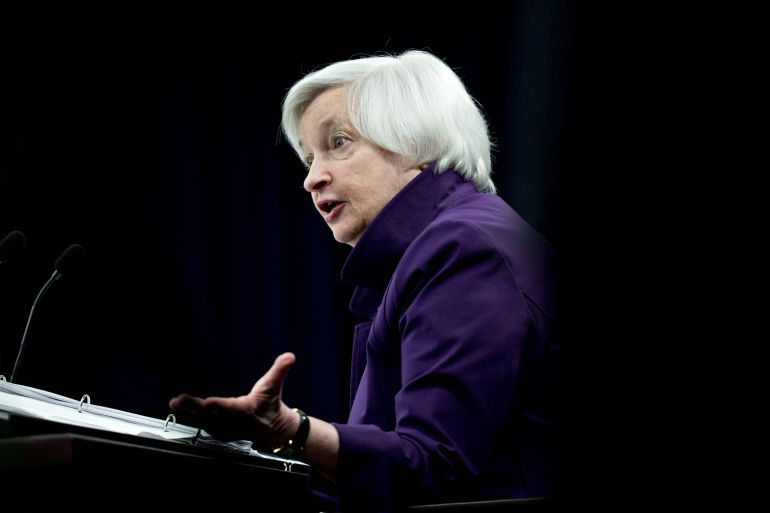Yellen spars with GOP senator on IMF help for poor countries
Senator John Kennedy said the extra cash influx by the International Monetary Fund would direct money from US taxpayers to China, Russia and Venezuela.

Treasury Secretary Janet Yellen is facing fierce Republican opposition for supporting a major expansion in funding for the International Monetary Fund’s efforts to help poor nations cope with the global pandemic.
In a testy exchange on Wednesday during a Senate Banking Committee hearing, GOP Senator John Kennedy said the extra cash influx would direct money from U.S. taxpayers to American adversaries like China, Russia and Venezuela.
Keep reading
list of 4 itemsUS economy healing but not fully recovered: Federal Reserve chief
Spend or save: Will Biden’s stimulus cheques boost the economy?
‘Not a dry science’: A call for women economists
“You say you want to help poor countries, but you and I both know that only about 10% of that is going to go to poor countries,” with much of the money being put in the hands of countries the U.S. has deemed bad actors, Kennedy said — without specifying the source of his estimate.
The fund announced Tuesday it’s aiming for member countries to back $650 billion in additional reserve funds, known as special drawing rights, or SDRs, to help low-income nations cope with the Covid-19 pandemic. Yellen last month reversed a Trump administration stance opposing the new funding, and the Group of Seven nations has already weighed in with their support.
Kennedy said that American taxpayers will need to pay $180 billion for that increased allocation. Yellen replied that it won’t cost taxpayers that much, though the U.S. may issue Treasuries to fund its support of the IMF measure.
The senator interrupted, shouting, “I rest my case!” to which Yellen raised her voice and said: “I’m sorry!,” adding that the U.S.’s involvement will be “essentially a wash” because of interest earned on converting the funds for other nations.
‘No Disrespect’
Kennedy responded: “No disrespect, but I think you’re wrong. I think we’re going to have to borrow all $180 billion of this.”
“I don’t know where you got a number like that from,” she said.
“When China comes to redeem its SDRs and says ‘We want dollars,’ where do you think we’re going to get the money?” Kennedy asked Yellen. “We’re going to borrow it.”
The exchange ended with Kennedy and Yellen agreeing to speak by phone.
The tiff illustrates how Republican opposition is growing louder as the IMF moves toward a deal to expand its reserve assets for the first time since 2009.
Such a decision requires consent from the U.S. as the IMF’s largest shareholder, but not specifically from Congress, since the proposed amount is short of a roughly $680 billion threshold for approval.
IMF Allocations
Yellen will need to provide lawmakers with only a 90-day notice of an official vote supporting the move. Since Democrats hold a thin Senate majority and generally support the IMF reserves plan, Republicans face an uphill battle to counter it.
The IMF allocates SDRs based on share of the fund. That means that 58% of the new SDRs would go to advanced economies, with 42% for emerging and developing economies –- and just 3.2% to the smaller subset of low-income nations.
Proponents of boosting reserves argue there would still be more than $20 billion for the poorest countries, like Zambia and Chad, which have been so squeezed that they’ve already applied to rework their debt with the Group of 20.
During Wednesday’s hearing, Republican Senator Pat Toomey of Pennsylvania also pressed Yellen on the issue, raising concerns that China would fail to be transparent about its use.
China Concerns
Yellen told Toomey, “Many countries have indicated a willingness to recycle the SDRs they receive either in the form of loans or grants to low-income countries,” which will magnify the impact of the funding.
A Treasury spokeswoman declined to provide additional details on which countries have made such commitments.
Also on Wednesday, Republican Senator Marco Rubio of Florida released a statement urging the Biden administration to reject the IMF funding.
“There is absolutely no reason to use American taxpayer dollars to do the bidding of Xi Jinping, who is committing genocide against the Uyghurs and persecuting Hong Kong’s pro-democracy movement,” he said, referring to China’s president.
One concern raised by GOP Representative French Hill in a separate hearing at the House on Tuesday was the potential for credit from the fund to be used to repay “predatory lending” from China under its Belt and Road Initiative.
“We do want to make sure that SDR allocations are used” by poorer nations to “address real needs, and we’ll work with them and with China to ensure that they don’t go to repay their loans from the Belt and Road initiative,” Yellen said in response to a question from Hill.